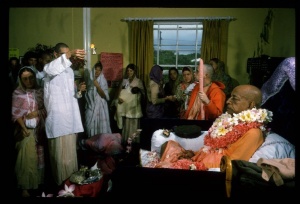SB 4.14.9: Difference between revisions
m (1 revision(s)) |
No edit summary |
||
| Line 1: | Line 1: | ||
{{info | {{info | ||
|speaker=Maitreya | |speaker=Maitreya Ṛṣi | ||
|listener=Vidura | |listener=Vidura | ||
}} | }} | ||
[[Category:Srimad-Bhagavatam - Canto 04 Chapter 14|S09]] | |||
[[Category:Bhagavatam Verses Spoken by Maitreya Rsi - Vanisource|041409]] | |||
<div style="float:left">'''[[Srimad-Bhagavatam]] - [[SB 4|Fourth Canto]] - [[SB 4.14: The Story of King Vena|Chapter 14: The Story of King Vena]]'''</div> | |||
<div style="float:right">[[File:Go-previous.png|link=SB 4.14.8]] '''[[SB 4.14.8]] - [[SB 4.14.10]]''' [[File:Go-next.png|link=SB 4.14.10]]</div> | |||
{{RandomImage}} | |||
==== TEXT 9 ==== | ==== TEXT 9 ==== | ||
<div | <div class="verse"> | ||
arājaka-bhayād eṣa | :arājaka-bhayād eṣa | ||
kṛto rājātad-arhaṇaḥ | :kṛto rājātad-arhaṇaḥ | ||
tato 'py āsīd bhayaṁ tv adya | :tato 'py āsīd bhayaṁ tv adya | ||
kathaṁ syāt svasti dehinām | :kathaṁ syāt svasti dehinām | ||
</div> | </div> | ||
| Line 16: | Line 22: | ||
==== SYNONYMS ==== | ==== SYNONYMS ==== | ||
<div | <div class="synonyms"> | ||
''arājaka''—being without a king; ''bhayāt''—out of fear; ''eṣaḥ''—this Vena; ''kṛtaḥ''—was made; ''rājā''—the king; ''a-tat-arhaṇaḥ''—though not qualified for it; ''tataḥ''—from him; ''api''—also; ''āsīt''—there was; ''bhayam''—danger; ''tu''—then; ''adya''—now; ''katham''—how; ''syāt''—can there be; ''svasti''—happiness; ''dehinām''—of the people in general. | |||
</div> | </div> | ||
| Line 23: | Line 29: | ||
==== TRANSLATION ==== | ==== TRANSLATION ==== | ||
<div | <div class="translation"> | ||
Thinking to save the state from irregularity, the sages began to consider that it was due to a political crisis that they made Vena king although he was not qualified. But alas, now the people were being disturbed by the king himself. Under such circumstances, how could the people be happy? | Thinking to save the state from irregularity, the sages began to consider that it was due to a political crisis that they made Vena king although he was not qualified. But alas, now the people were being disturbed by the king himself. Under such circumstances, how could the people be happy? | ||
</div> | </div> | ||
| Line 30: | Line 36: | ||
==== PURPORT ==== | ==== PURPORT ==== | ||
<div | <div class="purport"> | ||
In Bhagavad-gītā ([[BG 18.5]]) it is stated that even in the renounced order one should not give up sacrifice, charity and penance. The brahmacārīs must perform sacrifices, the gṛhasthas must give in charity, and those in the renounced order of life (the vānaprasthas and sannyāsīs) must practice penance and austerities. These are the procedures by which everyone can be elevated to the spiritual platform. When the sages and saintly persons saw that King Vena had stopped all these functions, they became concerned about the people's progress. Saintly people preach God consciousness, or Kṛṣṇa consciousness, because they are anxious to save the general populace from the dangers of animalistic life. There must be a good government to see that the citizens are actually executing their religious rituals, and thieves and rogues must be curbed. When this is done, the people can advance peacefully in spiritual consciousness and make their lives successful. | In [[Bhagavad-gita As It Is (1972)|''Bhagavad-gītā'']] ([[BG 18.5 (1972)|BG 18.5]]) it is stated that even in the renounced order one should not give up sacrifice, charity and penance. The ''brahmacārīs'' must perform sacrifices, the ''gṛhasthas'' must give in charity, and those in the renounced order of life (the ''vānaprasthas'' and ''sannyāsīs'') must practice penance and austerities. These are the procedures by which everyone can be elevated to the spiritual platform. When the sages and saintly persons saw that King Vena had stopped all these functions, they became concerned about the people's progress. Saintly people preach God consciousness, or Kṛṣṇa consciousness, because they are anxious to save the general populace from the dangers of animalistic life. There must be a good government to see that the citizens are actually executing their religious rituals, and thieves and rogues must be curbed. When this is done, the people can advance peacefully in spiritual consciousness and make their lives successful. | ||
</div> | </div> | ||
__NOTOC__ | |||
<div style="float:right; clear:both;">[[File:Go-previous.png|link=SB 4.14.8]] '''[[SB 4.14.8]] - [[SB 4.14.10]]''' [[File:Go-next.png|link=SB 4.14.10]]</div> | |||
__NOTOC__ | |||
__NOEDITSECTION__ | |||
Revision as of 10:59, 17 May 2021

A.C. Bhaktivedanta Swami Prabhupada
TEXT 9
- arājaka-bhayād eṣa
- kṛto rājātad-arhaṇaḥ
- tato 'py āsīd bhayaṁ tv adya
- kathaṁ syāt svasti dehinām
SYNONYMS
arājaka—being without a king; bhayāt—out of fear; eṣaḥ—this Vena; kṛtaḥ—was made; rājā—the king; a-tat-arhaṇaḥ—though not qualified for it; tataḥ—from him; api—also; āsīt—there was; bhayam—danger; tu—then; adya—now; katham—how; syāt—can there be; svasti—happiness; dehinām—of the people in general.
TRANSLATION
Thinking to save the state from irregularity, the sages began to consider that it was due to a political crisis that they made Vena king although he was not qualified. But alas, now the people were being disturbed by the king himself. Under such circumstances, how could the people be happy?
PURPORT
In Bhagavad-gītā (BG 18.5) it is stated that even in the renounced order one should not give up sacrifice, charity and penance. The brahmacārīs must perform sacrifices, the gṛhasthas must give in charity, and those in the renounced order of life (the vānaprasthas and sannyāsīs) must practice penance and austerities. These are the procedures by which everyone can be elevated to the spiritual platform. When the sages and saintly persons saw that King Vena had stopped all these functions, they became concerned about the people's progress. Saintly people preach God consciousness, or Kṛṣṇa consciousness, because they are anxious to save the general populace from the dangers of animalistic life. There must be a good government to see that the citizens are actually executing their religious rituals, and thieves and rogues must be curbed. When this is done, the people can advance peacefully in spiritual consciousness and make their lives successful.